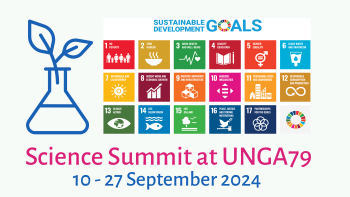Science Summit at United Nations General Assembly (UNGA79)
ISC and its partners will organise the 9th edition of the Science Summit around the 79th United Nations General Assembly (UNGA79) on 10-27 September 2024.
The role and contribution of science in attaining the United Nations Sustainable Development Goals (SDGs) will be the central theme of the Science Summit. The objective is to enable science collaborations to demonstrate how science supports the attainment of the UN SDGs and Agenda 2030. The meeting will also prepare input for the United Nations Summit of the Future, which will take place during UNGA79 on 16-17 September 2024.
The Summit will examine what enabling policy, regulatory and financial environments are needed to implement and sustain the science mechanisms required to support genuinely global scientific collaborations across continents, nations and themes. Scientific discovery through the analysis of massive data sets is at hand. This data-enabled approach to science, research and development will be necessary if the SDGs are to be achieved.
SSUNGA79 builds on the successful Science Summit at UNGA78, which brought together over 1800 speakers from all continents in more than 400 sessions.
SSUNGA79 will bring together thought leaders, scientists, technologists, innovators, policymakers, decision-makers, regulators, financiers, philanthropists, journalists and editors, and community leaders to increase collaborations across a broad spectrum of themes including ICT, health, nutrition, agriculture, astronomy, the environment, climate, geodesy and space, amongst others.
You can also view session banners of the last Science Summit at UNGA 78 September 2023
Objectives
▶ Present key science initiatives in a series of workshops, presentations, seminars, roundtables and plenary sessions addressing each of the 17 UN SDGs and the associated targets.
▶ Promote collaboration by enabling researchers, scientists and civil society organisations to become aware of each other and work to understand and address critical challenges.
▶ Promote inclusive science, including increasing access to scientific data by lower and middle-income countries.
▶ Focus meetings will be organised around each of the UN SDGs, bringing key stakeholders together to understand and advance global approaches.
▶ Priority will be given to developing science capacity globally to implement the SDGs.
▶ Demonstrate how research infrastructures work as a driver for international cooperation.
▶ Promote awareness of data-enabled science and related capacities and infrastructures.
▶ Understand how key UN initiatives, including the UN Global Digital Compact, LOCAL 2030, and the UN Summit of the Future in 2024, can provide a basis for increasing science cooperation globally to address global challenges.
Highlights
Meetings on Wall Street and with the New York Stock Exchange will highlight the role of industry in supporting the contribution of science to the SDGs and the post-SDG debate.
The Science Summit will bring together scientists and related stakeholders from around the world.
A powerful youth programme for children, teens and students. This includes a space-related initiative currently involving some 60 countries, and this number is very likely to increase. To inspire the world’s youth to come together and lead regional inter-generation projects to attain the “moonshots” of the 21st century – the first in this series would be the 2030 SDGs.
A Youth Parliament will amplify young voices in AI and data regulation discourse, focusing on vital areas such as ethics, privacy, accountability, and the societal ramifications of emerging technologies. Recognising the typically limited representation of youth in these crucial conversations, the Science Summit seeks to empower the next generation to share their insights and visions.

